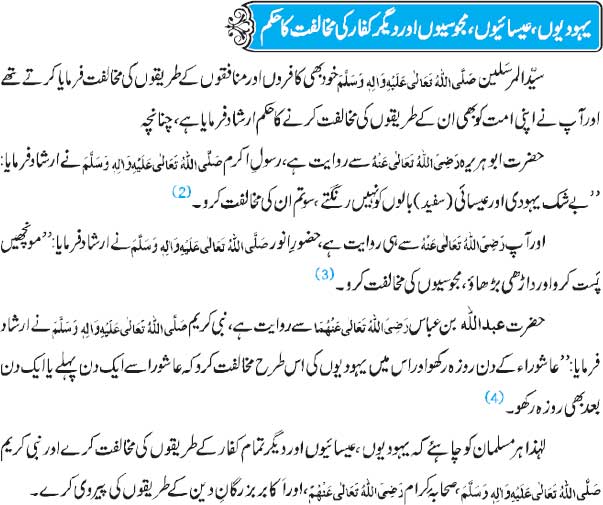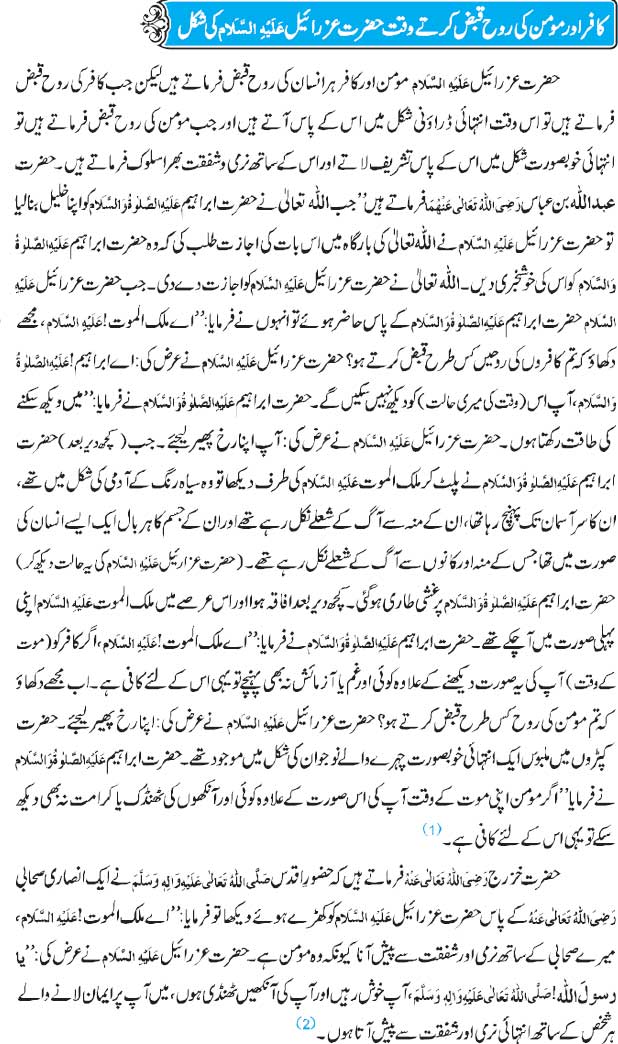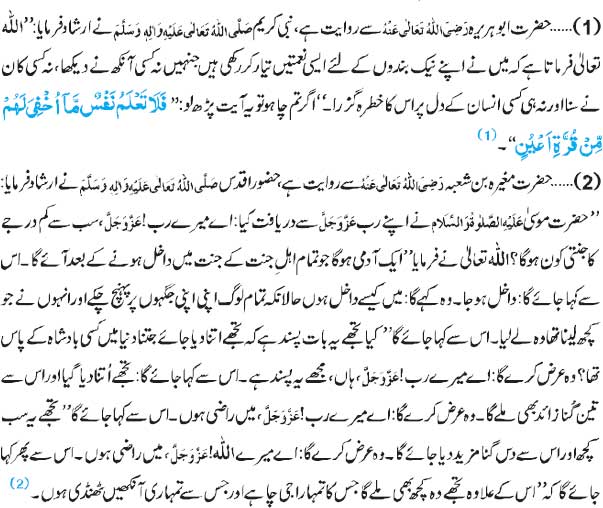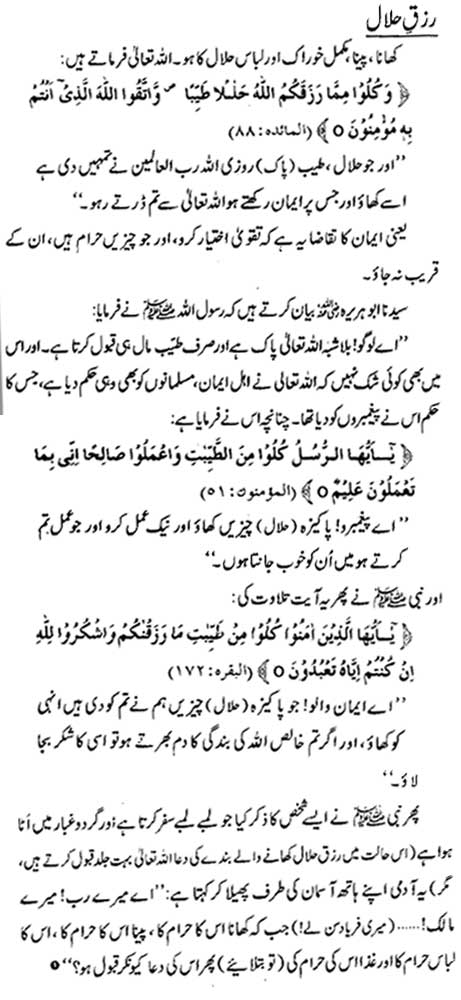
Kufaar Ki Mukhalfat Ka Hukam


ABDUR – RAHMAN IBN AWF (ra – may the peace & blessings of Allah be upon him)
He was one of the first eight persons to accept Islam. He was one of the ten persons (al-asharatu-al-mubashshirin) who were assured of entering Paradise. He was one of the six persons chosen by Umar (ra – may Allah be pleased with him) to form the council of shura (consultation) to choose the Khalifah (caliph) after his death. His name in Jahiliyyah (ignorance i.e. before the coming of Islam) days was Abu Amr. But when he accepted Islam the noble Prophet (saw – may the peace & blessings of Allah be upon him) called him Abdur-Rahman – the servant of the Beneficent God.
Abdur-Rahman (ra) became a Muslim before the Prophet entered the house of al-Arqam. In fact it is said that he accepted Islam only two days after Abu Bakr as-Siddiq (ra) did so. Abdur-Rahman (ra) did not escape the punishment which the early Muslims suffered at the hands of the Quraysh. He bore this punishment with steadfastness as they did. He remained firm as they did. And when they were compelled to leave Makkah for Abyssinia because of the continuous and unbearable persecution, Abdur-Rahman (ra) also went. He returned to Makkah when it was rumored that conditions for the Muslims had improved but, when these rumors proved to be false, he left again for Abyssinia on a second hijrah (migration). From Makkah once again he made the hijrah to Madeenah.
Soon after arriving in Madeenah, the Prophet (saw) in his unique manner began pairing off the Muhajirin (those who migrated) and the Ansar (the helpers). This established a firm bond of brotherhood and was meant to strengthen social cohesion and ease the destitution of the Muhajirin. Abdur-Rahman (ra) was linked by the Prophet (saw) with Sa’d ibn ar-Rabi’ah (ra). Sa’d (ra) in the spirit of generosity and magnanimity with which the Ansar greeted the Muhajirin, said to Abdur-Rahman (ra): “My brother! Among the people of Madeenah, I have the most wealth. I have two orchards and I have two wives. See which of the two orchards you like and I shall vacate it for you and which of my two wives is pleasing to you and I will divorce her for you.”
Abdur-Rahman (ra) must have been embarrassed and said in reply: “May God bless you in your family and your wealth. But just show me where the sooq (market place) is..”Abdur-Rahman (ra) went to the market-place and began trading with whatever little resources he had. He bought and sold and his profits grew rapidly. Soon he was sufficiently well off and was able to get married. He went to the noble Prophet (saw) with the scent of perfume lingering over him.
“Mahyarn, O Abdur-Rahman (ra)!” exclaimed the Prophet (saw) – “mahyam” being a word of Yemeni origin which indicates pleasant surprise.
“I have got married,” replied Abdur-Rahman (ra). “And what did you give your wife as mahr (dowry)?” “The weight of a nuwat in gold.”
“You must have a walimah (wedding feast) even if it is with a single sheep. And may Allah bless you in your wealth,” said the Prophet (saw) with obvious pleasure and encouragement.
Thereafter Abdur-Rahman (ra) grew so accustomed to business success that he said if he lifted a stone he expected to find gold or silver under it! Abdur-Rahman (ra) distinguished himself in both the battles of Badr and Uhud. At Uhud he remained firm throughout and suffered more than twenty wounds some of them deep and severe. Even so, his physical jihad was matched by his jihad with his wealth.
Once the Prophet, may God bless him and grant him peace, was preparing to despatch an expeditionary force. He summoned his companions and said:
“Contribute sadaqah (charity) for I want to despatch an expedition.” Abdur-Rahman (ra) went to his house and quickly returned. “O Messenger of God (saw),” he said, “I have four thousand (dinars). I give two thousand as a qard to my Lord and two thousand I leave for my family. “
When the Prophet (saw) decided to send an expedition to distant Tabuk – this was the last ghazwah (battle) of his life that he mounted – his need for finance and material was not greater than his need for men for the Byzantine forces were a numerous and well-equipped foe. That year in Madinah was one of drought and hardship. The journey to Tabuk was long, more than a thousand kilometers. Provisions were in short supply. Transport was at a premium so much so that a group of Muslims came to the Prophet (saw) pleading to go with him but he had to turn them away because he could find no transport for them.
These men were sad and dejected and came to be known as the Bakka’in or the Weepers and the army itself was called the Army of Hardship (‘Usrah). Thereupon the Prophet (saw) called upon his companions to give generously for the war effort in the path of God and assured them they would be rewarded. The Muslims’ response to the Prophet’s (saw) call was immediate and generous. In the forefront of those who responded was Abdur-Rahman ibn Awl (ra). He donated two hundred awqiyyah of gold whereupon Umar ibn al-Khattab (ra) said to the Prophet (saw):
“I have (now) seen Abdur-Rahman (ra) committing a wrong. He has not left anything for his family.”
“Have you left anything for your family, Abdur-Rahman (ra)?” asked the Prophet (saw).
“Yes,” replied Abdur-Rahman (ra). “I have left for them more than what I could ever give and better.” “How much?” enquired the Prophet (saw).
“What God and His Messenger (saw) have promised of sustenance, goodness and reward i.e. Allah and His messenger (Islam),” replied Abdur-Rahman (ra).
The Muslim army eventually left for Tabuk. There Abdur-Rahman (ra) was blessed with an honor which was not conferred on anyone till then. The time of Salat (prayer) came and the Prophet, peace be on him, was not there at the time. The Muslims chose Abdur-Rahman (ra) as their imam. The first rakat (unit of prayer) of the Salat was almost completed when the Prophet, may God bless him and grant him peace, joined the worshippers and performed the Salat behind Abdur-Rahman ibn Awl (ra). Could there be a greater honor conferred on anyone than to have been the imam of the most honored of God’s creation, the imam of the Prophets, the imam of Muhammad, the Messenger of God!
When the Prophet, peace be on him, passed away, Abdur-Rahman (ra) took on the responsibility of looking after the needs of his family, the Ummahaat al-Muminin (the Mothers of the believers). He would go with them wherever they wanted to and he even performed Hajj with them to ensure that all their needs were met. This is a sign of the trust and confidence which he enjoyed on the part of the Prophet’s (saw) family.
Abdur-Rahman’s (ra) support for the Muslims and the Prophet’s wives (ra – may Allah be pleased with them all) in particular was well-known. Once he sold a piece of land for forty thousand dinars and he distributed the entire amount among the Banu Zahrah (the relatives of the Prophet’s (saw) mother Aminah), the poor among the Muslims and the Prophet’s wives (saw). When Aishah, may God be pleased with her, received some of this money she asked:
“Who has sent this money?” and was told it was Abdur-Rahman (ra), whereupon she said:”The Messenger of God, may God bless him and grant him peace, said: No one will feel compassion towards you after I die except the sabirin (those who are patient and resolute).”
The prayer of the noble Prophet (saw) that Allah should bestow barakah (blessings) on the wealth of Abdur-Rahman (ra) appeared to be with Abdur-Rahman (ra) throughout his life. He became the richest man among the companions of the Prophet (saw). His business transactions invariably met with success and his wealth continued to grow. His trading caravans to and from Madinah grew larger and larger bringing to the people of Madinah wheat, flour, butter, cloths, utensils, perfume and whatever else was needed and exporting whatever surplus produce they had.
One day, a loud rumbling sound was heard coming from beyond the boundaries of Madinah normally a calm and peaceful city. The rumbling sound gradually increased in volume. In addition, clouds of dust and sand were stirred up and blown in the wind.
The people of Madinah soon realized that a mighty caravan was entering the city. They stood in amazement as seven hundred camels laden with goods moved into the city and crowded the streets. There was much shouting and excitement as people called to one another to come out and witness the sight and see what goods and sustenance the camel caravan had brought.
Aishah, may God be pleased with her, heard the commotion and asked: “What is this that’s happening in Madinah?” and she was told: “It is the caravan of Abdur-Rahman ibn Awl (ra) which has come from Syria bearing his merchandise.”
“A caravan making all this commotion?” she asked in disbelief.”
“Yes, O Umm al-Muminin (mother of the believers). There are several hundred camels.”
Aishah (ra – may Allah be pleased with her) shook her head and gazed in the distance as if she was trying to recall some scene or utterance of the past and then she said: “I have heard the Messenger of God (saw), may God bless him and grant him peace, say: I have seen Abdur-Rahman ibn Awl (ra) entering Paradise creeping.”
Why creeping? Why should he not enter Paradise leaping and at a quick pace with the early companions (ra – may Allah be pleased with them all) of the Prophet (saw)?
Some friends of his related to Abdur-Rahman (ra) the hadith which Aishah (ra) had mentioned. He remembered that he had heard the hadith more than once from the Prophet (saw) and he hurried to the house of Aishah (ra) and said to her: “Yaa Ammah! Have you heard that from the Messenger of God, may God bless him and grant him peace?”
“Yes,” she replied.
“You have reminded me of a hadith which I have never forgotten,” he is also reported to have said. He was so over-joyed and added: “If I could I would certainly like to enter Paradise standing. I swear to you, yaa Ammah, that this entire caravan with all its merchandise, I will giver sabilillah (in the path of God).”
And so he did. In a great festival of charity and righteousness, he distributed all that the massive caravan had brought to the people of Madinah and surrounding areas.
This is just one incident which showed what type of man Abdur-Rahman (ra) was. He earned much wealth but he never remained attached to it for its own sake and he did not allow it to corrupt him.
Abdur-Rahman’s (ra) generosity did not stop there. He continued giving with both his hands, secretly and openly. Some of the figures mentioned are truly astounding: forty thousand dirhams of silver, forty thousand dinars of gold, two hundred awqiyyah of gold, five hundred horses to mujahidin setting out in the path of God and one thousand five hundred camels to another group of mujahidin, four hundred dinars of gold to the survivors of Badr and a large legacy to the Ummahaat al Muminin and the catalogue goes on. On account of this fabulous generosity, Aishah (ra) said:
“May God give him to drink from the water of Salsabil (a spring in Paradise).” All this wealth did not corrupt Abdur-Rahman (ra) and did not change him. When he was among his workers and assistants, people could not distinguish him from them. One day food was brought to him with which to end a fast. He looked at the food and said: “Musab ibn Umayr (ra) has been killed. He was better than me. We did not find anything of his to shroud him with except what covered his head but left his legs uncovered. Then God endowed us with the (bounties of) the world… I really fear that our reward has been bestowed on us early (in this world).” He began to cry and sob and could not eat. May Abdur-Rahman ibn Awl be (ra) granted felicity among:-
“those who spend their substance in the cause of God and follow up not their gifts with reminders of their generosity or with injury. For them their reward is with their Lord, on them shall be no fear nor shall they grieve”. (The Qur’?n, Surah al-Baqarah, 2: 262)

[ALLAH’S Quran – 2:193] “And fight them on until there is no more Tumult or oppression, and there prevail justice and faith in Allah; but if they cease, Let there be no hostility except to those who practice oppression.”
The Prophet (Peace Be Upon Him) has said :
[Muslim, Book #032, Hadith #6247 ] “Abu Dharr reported Allah’s Messenger (may peace be upon him) as saying that he reported it from his Lord, the Exalted and Glorious: Verily I have made oppression unlawful for Me and for My servants too, so do not commit oppression.”
[Muslim, Book #032, Hadith #6248 ] “Jabir b. Abdullah reported that Allah’s Messenger (may peace be upon him) said: Be on your guard against committing oppression, for oppression is a darkness on the Day of Resurrection, and be on your guard against petty mindedness for petty mindedness destroyed those who were before you, as it incited them to shed blood and make lawful what was unlawful for them.”
[Muslim, Book #032, Hadith#6250] “Salim reported on the authority of his father that Allah’s Messenger (may peace be upon him) said: A Muslim is the brother of a fellow-Muslim. He should neither commit oppression upon him nor ruin him, and he who meets the need of a brother, Allah would meet big needs, and he who relieved a Muslim from hardship Allah would relieve him from the hardships to which he would be put on the Day of Resurrection, and he who did not expose (the follies of a Muslim) Allah would conceal his follies on the Day of Resurrection.”
[Sunnan Abudawud, Book #41, Hadith #4884] “Narrated Abu Bakrah: The Prophet (peace_be_upon_him) said: There is no sin more fitted to have punishment meted out by Allah to its perpetrator in advance in this world along with what He stores up for him in the next world than oppression and severing ties of relationship.”

The punishment for a sin committed by a believer is removed in ten ways:
1. He repents to Allah (taubah), so Allah accepts his repentance, for the one who repents from sin is like the one who has no sin.
2. He seeks forgiveness from Allah (istighfar), so Allah forgives him.
3. He does good deeds that erase his sin for good deeds erase bad ones.
4. His believing brethren pray for him or seek forgiveness for his sins during his life or death.
5. Or they [ask Allah] to bestow on him as gift from the reward for their deeds, with which Allah benefits him.
6. His Prophet Muhammad, sallallahu `alayhi wa sallam, intercedes for him.
7. Allah tests him with trials in this world which expiate his sin.
8. Allah tests him in al-Barzakh (the intermediate life in the grave, between the death and the Day of Judgment) which expiates his sin.
9. Allah tests him in the various stages of the Day of Judgment which expiates his sins.
10. Or the Most Merciful of those who have mercy has mercy on him.
Whoever, then, is missed by these ten cannot blame anyone but himself.

Love and hate are among the actions of the heart. It is obligatory upon the pubescent person to use these two emotions in accordance with the rules of the Religion. One must love Allah and what is in accordance with the rules of Islam. Also, one must hate the devil and what he whispers of sinful matters.
1. Loving Allah and His Messenger, sallallahu Alayhi wa sallam: The pubescent person is obligated to love Allah, His Quran, and His Prophet. This is done by following the orders of Islam and avoiding its unlawful matters.
Allah, ta’ala said:
Ayah 31 of Suratu Al ‘Imran means: (Say, O Muhammad, If you love Allah, then follow me, and Allah will love you)
This is an essential part of believing in Allah, what He revealed, and believing in the Prophet and what he brought. The doubt in Allah, on the other hand, His Quran, or His Messenger is among the sins of the heart. In fact it is blasphemy, which takes one out of the Religion of Islam.
2. Loving the companions, relatives (Al) of the Prophet, and the pious Muslims: Among the obligations of the heart is loving the Companions, relatives (Al) of the Prophet, and the pious Muslims. Failing to love them is one of the sins of the heart. Mocking or cursing them is among the sins of the tongue.
The Companions: They are the Companions of the Prophet. They supported the Religion of Allah and spread it, especially the earlier ones who immigrated with the Prophet, sallallahu Alayhi wa sallam, and those who received him in Madinah. The Companions are the people who met the Prophet during his life and believed in him, whether they knew him for a long or a short time, as long as they died on the correct belief.
The Relatives (Al) of the Prophet: This term is given to the wives of the Prophet such as Khadijah and Aishah. It also refers to his Muslim relatives, like Hamzah, al-Abbas, Aliyy, al-Hasan, al-Husayn, and their mother Fatimah (may Allah raise all their ranks).
Loving the Al of the Prophet is an obligation because of the merit they have. If one means by the term Al the God-fearing pious people, which is one of its meanings, then loving them is an obligation, because they are beloved to Allah due to their ideal behavior in obeying Allah.
The Pious Muslims: They are the ones who have performed all the obligations and avoided all the sins. Among these categories are the scholars, and the highly righteous Muslims.
3. Hating the Devil and Sins: Among what is also obligatory on the heart is hating the devil and the sins. Also, one must regret performing the sins.
We ask Allah to strengthen our love to Allah and His Prophet and increase as we live.
Allah knows best

{Invite (mankind, O Muhammad ) to the Way of your Lord (i.e. Islam) with wisdom (i.e. with the Divine Inspiration and the Qur’an) and fair preaching, and argue with them in a way that is better. Truly, your Lord knows best who has gone astray from His Path, and He is the Best Aware of those who are guided.}
(Holy Quran-16:125)
{And who is better in speech than he who [says: “My Lord is Allah (believes in His Oneness),” and then stands straight (acts upon His Order), and] invites (men) to Allah’s (Islamic Monotheism), and does righteous deeds, and says: “I am one of the Muslims.”} (Holy Quran-41:33)
The prophet (peace and blessings of Allah be upon him) said: “By Allah, if Allah guides one person by you, it is better for you than the best types of camels.” [al-Bukhaaree, Muslim]
The prophet (peace and blessings of Allah be upon him) also said, “Whoever calls to guidance will have a reward similar to the reward of the one who follows him, without the reward of either of them being lessened at all.”
[Muslim, Ahmad, Aboo Daawood, an-Nasaa’ee, at-Tirmidhee, Ibn Maajah]
